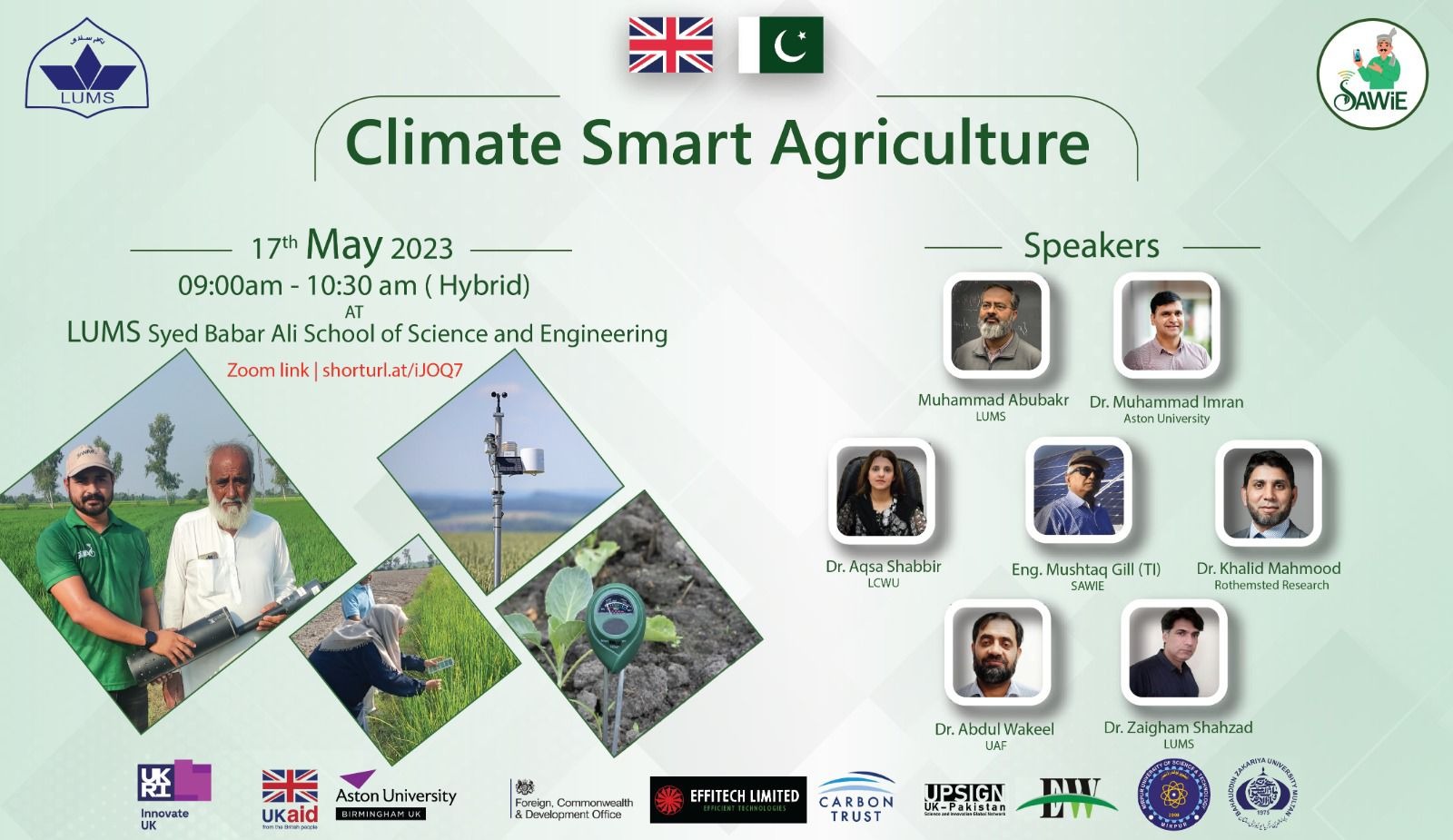LUMS, water and informatics center(WIT) organized an international hybrid event together with UK Pakistan Science and Innovation Global Network (UPSIGN), SAWIE and UKRI Partners to address the food security challenge of Pakistan. The country faced the worst heat and flooding in early spring and summer seasons affecting more than 30 million people. The changing climate conditions have a direct effect on agriculture and food production in Pakistan.
Dr. Abubakr Muhammad, Direct WIT, briefed Agriculture Sector Transformation for Carbon Neutrality and Water Security in Pakistan. He emphasized the need to develop climate-smart agriculture, sustainable management practices and solutions to commercialize high efficiency-crop-water management systems. In this regard, IOT, Robotics, Sensors and remote sensing are initial solutions for future sustainability.
Dr. Muhammad Imran (Aston University) presented UKRI funded project, “Hybrid Energy Powered Smart Irrigation System for Small Land Holder Farmers”. He elaborated how “Solar and Wind Energy combined” would provide renewable energy to small-scale farmers for irrigation and this would be a cost-effective, efficient, and zero-emission energy source that would increase farmer’s earnings.
Eng. Mushtaq Gill (TI) (CEO SAWiE) highlighted the “Climate Smart Agriculture” and elaborated how SAWIE has developed success stories and Farmer Field School incentives that encourage small landholders to adopt new Climate Smart Practices and Technology. Dr. Aqsa Shabbir (LCWU) directed the community towards a new Smart Solution “Solar Radiation Management on Agriculture”.
Dr. Abdul Wakeel (UAF) emphasized “Improving Nitrogen use efficiency to achieve NetZero Food system” Right selection of fertilizers, cultivar, placement of fertilizers, rate, use of amendment, and legumes inclusion can increase NUE. Dr. Zaigham Shahzad shared the hidden treasure of Regenerative Agriculture, “Genetics of Regenerative Agriculture”. The webinar had experts from UK & Pakistani universities and industry partners including Aston University Birmingham, Mirpur University of Science and Technology (MUST), BZU Multan, Effitech, e-works & SAWIE. Participants expressed their views and were collective of the view that technology development, Socio-hydrology discourses, Policy tool for the Water-Food-Energy nexus, Sustainable energy development, and Capacity building and partnership can tackle agri-issues.
Dr Khalid Mahmood highlighted the need to support smallholder farmers to adopt sustainable agriculture practices that reduce losses and improve productivity through protecting precious natural resources of soil, water, and biodiversity. Improving soil health through the use of crop rotation and tillage methods has proven successful in several parts of the world. Improving water productivity per drop of water will help to address food security. Digital advisory services play a critical role in timely informing farmers to make suitable decisions, quickly and wisely.
The event had about 60 online participants from Pakistan and around the world.
The webinar has participation from UK & Pakistani universities and industry partners including Aston University Birmingham, Mirpur University of Science and Technology (MUST), Bahauddin Zakariya University (BZU) Multan, Effitech, e-works & SAWIE. These partners are part of a consortium leading on UKRI funded project “Hybrid Energy Powered Smart Irrigation System for Smallholder Farmers.
The local partner Dr. Zafar Ali Khan and his project team at the Mirpur University of Science and Technology (MUST) joined the event. The team emphasized the importance of the use of advanced forecasting and automation techniques and tools in the farming industry to ensure sustainable farming. Dr. Khan apprised UPSIGN and SAWIE for bringing together the team with diverse experience to develop a pathway for sustainable solutions to problems faced by the farming industry.
Dr. Muhammad Sultan and his project team at Bahauddin Zakariya University (BZU) joined the event. The Director (Test & Trail), AMRI, Multan is also collaborating with BZU team. The team discussed the need to develop a mathematical model to estimate the water requirement for selected cash and food crops, enabling more efficient and effective water usage in agriculture. The water requirement estimation will allow sizing of the water pumping system and energy module to power the pumping system.


